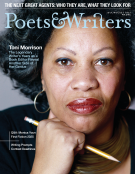Poetry: Magic Net
In the essay collection Exophony: Voyages Outside the Mother Tongue, translated from the Japanese by Lisa Hofmann-Kuroda and published by New Directions in June, Yoko Tawada explores various aspects of life, communication, and art through a lens of linguistic and cultural hybridity. In “Paris: This Language Which Is Not One,” Tawada writes about a poem by Paul Celan in which the German words for dwindling (Neige) and snow (Schnee) appear in adjacent lines, pointing out that Neige means snow in French. “To me, Celan’s poems have a multilingual structure akin to a magic net that even captures Japanese, a language he never knew,” Tawada notes. Write a poem in which you deploy a “magic net” that allows you the freedom to play with associative, expansive thinking, capturing any basic knowledge of words in other languages or dialects or registers. What unexpected connections can be made?
Fiction: All So Different
“It was all so different than he expected. / For years he’d been agnostic; now he meditated. / For years he’d dreamed of being an artist living abroad; / now he reread Baudelaire, Emerson, Bishop. / He’d never considered marriage … / Still, a force through the green fuse did drive.” So begins Henri Cole’s poem “At Sixty-Five,” which appears in The Other Love, forthcoming in July from Farrar, Straus and Giroux, a collection in which Cole reflects on the shifting observations of a person as they age and gain new perspective on the passing of time and the accumulation of memories. Write a short story from the point of view of someone older than you, which begins with the sentence “It was all so different than I expected.” Is your inclination to plot out key milestones in your character’s life before you begin writing or to simply see where the character’s meditations take you?
Nonfiction: Where Art Begins
In Zhang Yueran’s novel Women, Seated, translated from the Chinese by Jeremy Tiang and forthcoming in August from Riverhead Books, the protagonist Yu Ling works as a nanny for a wealthy couple and their young son in China, after initially taking on duties assisting in the art studio of her employer, Qin Wen. In a flashback, Yu Ling recalls a remark by Qin Wen about an artist she admires: “Do you know why Alice Neel liked drawing mothers and children so much? It’s because she abandoned her own child.” Compose a pair of short lyrical essays, one that originates from loss and one that begins with a thing achieved or acquired. You might start with your instinctive responses to personal losses and gains, whether physical or more abstract. Do your attendant essays mirror each other or diverge?
Suggested Reading
The Lab: Experiments in Writing Across Genre (Norton, July 2025) by Matthew Clark Davison and Alice LaPlante
Written by two novelists who also teach creative writing, The Lab takes as its premise the idea that great writing doesn’t start with form but rather with the unquenchable drive to create—and that writers should be encouraged to take risks and experiment before accepting a formal container into which they will write. Davison and LaPlante, who is also the author of The Making of a Story: A Norton Guide to Creative Writing (Norton, 2010) as well as the previous Suggested Reading pick Write Yourself Out of a Corner: 100 Exercises to Unlock Creativity (Norton, 2023), offer ninety exercises that challenge writers to play with genre, try a hybrid form, or make up an entirely new one.
Thumbnail credit: Waldemar








